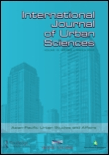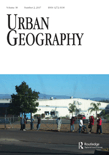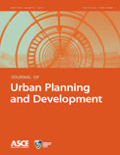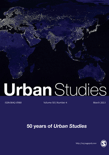
INTERNATIONAL JOURNAL OF URBAN SCIENCES
Scope & Guideline
Fostering Interdisciplinary Urban Dialogues
Introduction
Aims and Scopes
- Urban Sustainability and Resilience:
Research on sustainable urban practices, including transportation, infrastructure, and land use, aimed at enhancing the resilience of cities against environmental and social challenges. - Urban Mobility and Transportation Systems:
Studies focusing on the dynamics of urban mobility, including public transport, cycling, and pedestrian systems, as well as the impact of transportation on urban life and economy. - Socioeconomic Dynamics in Urban Contexts:
Exploration of socioeconomic factors that influence urban living, such as housing affordability, social equity, and community engagement in urban governance. - Technological Innovations in Urban Planning:
Investigations into the role of technology, including smart city initiatives and data analytics, in improving urban planning and management. - Environmental Impact and Urban Ecology:
Research assessing the ecological effects of urbanization, including studies on urban green spaces, air quality, and climate change adaptation. - Cultural and Social Dimensions of Urban Life:
Examination of cultural amenities, social interactions, and community identities within urban settings, contributing to the understanding of urban vibrancy.
Trending and Emerging
- Smart City Frameworks:
An increasing number of publications focus on smart city concepts, exploring how technology and data can be leveraged to enhance urban living and governance. - Impact of Pandemics on Urban Dynamics:
Research examining the effects of the COVID-19 pandemic on urban life, including mobility patterns, housing dynamics, and economic resilience, has surged in response to the global crisis. - Environmental Justice and Urban Ecology:
Emerging themes around environmental justice highlight the need to address disparities in access to green spaces and the impacts of urbanization on marginalized communities. - Participatory Urban Planning Techniques:
There is growing interest in participatory approaches that involve community engagement in urban planning processes, reflecting a trend towards more inclusive governance. - Interconnected Urban Systems:
Research is increasingly exploring the interconnections between various urban systems, such as transportation, housing, and social infrastructure, emphasizing a holistic view of urban challenges.
Declining or Waning
- Deindustrialization Studies:
Research specifically focused on the decline of industrial activities in urban areas has decreased, as the journal shifts towards more dynamic themes related to urban innovation and technological advancements. - Traditional Housing Studies:
Traditional studies on housing, particularly those focusing solely on tenure types and basic affordability metrics, have become less prominent as the discourse has moved towards integrated approaches involving sustainability and social equity. - Static Urban Planning Methodologies:
There is a noticeable decline in papers employing static models for urban planning, with a greater emphasis now placed on dynamic and participatory planning approaches that incorporate real-time data and community engagement. - Single-Dimensional Transport Studies:
Research that examines transportation issues in isolation, without considering broader urban contexts and multimodal interactions, has waned, reflecting a shift towards integrated transport systems.
Similar Journals

URBAN GEOGRAPHY
Exploring the Dynamics of Urban LandscapesURBAN GEOGRAPHY, published by Routledge Journals, Taylor & Francis Ltd, is a leading interdisciplinary journal that has been at the forefront of urban studies since its inception in 1980. With an impact factor that positions it in the prestigious Q1 category in both Geography, Planning and Development and Urban Studies, this journal is recognized for its rigorous research that informs policy and practice in urban environments. With a Scopus ranking of #20 out of 279 in the field of Urban Studies and #79 out of 821 in Geography, Planning and Development, it offers valuable insights for scholars, professionals, and students alike—enhancing our understanding of the complex dynamics that shape urban spaces. URBAN GEOGRAPHY is pivotal for those looking to advance their expertise in urban analytical frameworks, urbanization trends, and sustainable development strategies. Submissions are welcomed from a diverse range of perspectives, making it a vital resource for anyone invested in the future of urban landscapes.

Ciudad y Territorio-Estudios Territoriales-CyTET
Navigating the Complexities of City and TerritoryCiudad y Territorio-Estudios Territoriales-CyTET, published by the MINISTERIO FOMENTO, CENTRO PUBLICACIONES, is a premier journal dedicated to the interdisciplinary exploration of urban and regional studies. With an ISSN of 1133-4762, this Spanish journal serves as a vital platform for researchers and practitioners interested in the dynamics of geography, planning, and development. Recognized in the Q2 quartile for both Geography, Planning and Development and Urban Studies for 2023, CyTET represents a significant contribution to academic discourse, ranked at 145th in Urban Studies and 542nd in Geography, Planning and Development within the Scopus database. Notably, the journal’s converged issue years from 2014 to 2024 emphasize its ongoing commitment to staying current with the rapidly evolving challenges and innovations in urban environments. Although not Open Access, CyTET provides invaluable insights and research findings that are critical for professionals, scholars, and students aiming to enhance their understanding and impact in the realm of territorial studies.

Urbe-Revista Brasileira de Gestao Urbana
Fostering Dialogue for Sustainable Urban SolutionsUrbe-Revista Brasileira de Gestão Urbana is a prominent academic journal dedicated to the field of urban management and development, published by the esteemed Pontificia Universidade Catolica do Paraná (PUCPR). This open-access journal, actively disseminating knowledge since 2009, focuses on advancing awareness and understanding of urban planning, architecture, and geographical issues in Brazil and beyond. With an impressive impact reflected in its 2023 quartile rankings—Q2 in Architecture, Q3 in Geography, Planning and Development, and Q3 in Urban Studies—Urbe serves as a vital platform for researchers and professionals alike. The journal strives to foster interdisciplinary dialogue and provide valuable insights into contemporary urban challenges, making it an essential resource for those engaged in the study and practice of urban management. Scholars can access it freely, enhancing its reach and relevance in an increasingly interconnected world.

TeMA-Journal of Land Use Mobility and Environment
Shaping urban planning through critical insights and collaboration.TeMA - Journal of Land Use Mobility and Environment is a distinguished open-access journal published by the University of Naples Federico II, specifically by the Department of Planning and Territorial Science. Since its inception in 2008, the journal has dedicated itself to advancing the field of land use, mobility, and environmental studies, providing a platform for innovative research that shapes urban planning and environmental management practices. With an ISSN 1970-9889 and E-ISSN 1970-9870, the journal is committed to offering high-quality, peer-reviewed articles that address critical issues impacting society. Although currently positioned in the lower percentiles of Scopus rankings across various categories, including Geography, Planning and Development and Environmental Science, it plays a vital role in disseminating knowledge that is essential for researchers, policy-makers, and practitioners in these disciplines. Nestled in the heart of Naples, Italy, at Piazzale Tecchio 80, TeMA invites submissions from scholars around the world, fostering a collaborative atmosphere that emphasizes the importance of sustainable land use and mobility in the contemporary environment.

JOURNAL OF URBAN PLANNING AND DEVELOPMENT
Transforming Urban Futures, One Study at a Time.The JOURNAL OF URBAN PLANNING AND DEVELOPMENT, published by the ASCE-AMER SOC CIVIL ENGINEERS, stands as a pivotal platform in the realms of urban studies, civil and structural engineering, and development. With an ISSN of 0733-9488 and E-ISSN of 1943-5444, this journal aims to disseminate high-quality research addressing critical urban planning challenges, fostering innovative solutions, and contributing to sustainable development practices. Spanning from its inception in 1979 to the anticipated issues up to 2024, the journal proudly occupies the Q2 category across multiple disciplines, including Civil and Structural Engineering, Development, Geography, Planning and Development, and Urban Studies. Its noteworthy Scopus rankings reflect its influence, notably being positioned in the 76th percentile in Urban Studies. With no open access options currently available, the journal remains a selective forum for scholarly discourse, attracting researchers, professionals, and students eager to engage with cutting-edge developments in urban planning and design.

City and Environment Interactions
Connecting Research, Policy, and Practice for Urban SustainabilityCity and Environment Interactions, published by Elsevier, stands at the forefront of interdisciplinary research in urban studies and environmental science. As an Open Access journal since 2019, it facilitates the unrestricted dissemination of knowledge, catering to a global audience of researchers, professionals, and students interested in the dynamic interplay between urban environments and ecological systems. With a strong focus on innovative management, monitoring, policy, and law, the journal proudly holds Q1 rankings across multiple categories including Environmental Science, Geography, Planning and Development, and Urban Studies, reflecting its significant impact and relevance in the field. The journal's commitment to addressing pressing urban and environmental challenges positions it as a vital resource for advancing scholarship and practice in sustainable urban development. For more information, visit the journal's page on the Elsevier website.

Computational Urban Science
Advancing Urban Solutions with Computational InsightComputational Urban Science is a pioneering open-access journal published by SpringerNature, dedicated to the interdisciplinary exploration of urban systems through computational research and innovative technologies. Launched in 2021, the journal is committed to advancing understanding in fields such as Artificial Intelligence, Computer Science Applications, and Environmental Science, alongside its significant focus on Urban Studies—a category where it has attained a distinguished Q1 ranking. With a robust impact reflected in its Scopus rankings, including a 78th percentile in Urban Studies, Computational Urban Science serves as a vital platform for researchers and professionals seeking to address contemporary urban challenges with data-driven insights. This journal not only champions comprehensive discussions and research findings but also invites contributions that emphasize the role of computational methodologies in shaping sustainable urban environments. Embrace the opportunity to engage with transformative research and join a growing community dedicated to the future of urban science.

Urbano
Fostering Interdisciplinary Dialogue on Urban IssuesUrbano is a distinguished academic journal published by UNIV BIO-BIO, DEPT PLANIFICACION & DISENO in Chile, specializing in Urban Studies. With the ISSN 0717-3997 and E-ISSN 0718-3607, it has been committed to open-access publishing since 2000, aiming to disseminate vital research and insights that contribute to the dynamic field of urban planning and design. The journal's impressive trajectory includes acceptance into Scopus, featuring a 2023 ranking of #162 out of 279 in the Urban Studies category, placing it in the 42nd percentile. Urbano serves as a platform for innovative ideas and interdisciplinary approaches, inviting researchers, practitioners, and students to engage with high-quality content from 2016 to 2024. By addressing contemporary urban challenges, it not only enriches academic discourse but also actively supports the development of sustainable urban environments across Latin America and beyond.

URBAN STUDIES
Advancing Knowledge in Urban Studies and Environmental ScienceURBAN STUDIES, published by SAGE Publications Ltd, stands as a premier journal in the field of urban studies and environmental science, evidenced by its prestigious Q1 ranking in both categories for 2023. With an ISSN of 0042-0980 and an E-ISSN of 1360-063X, this UK-based journal has been disseminating pivotal research since its inception in 1964, and will continue to do so until 2024. As a leader in the social sciences, it ranks #11 out of 279 in the field of Urban Studies and #15 out of 219 in Environmental Science, achieving remarkable percentiles of 96% and 93% respectively. Although not an open-access journal, URBAN STUDIES provides a platform where scholars, practitioners, and students can engage with cutting-edge research, critical analyses, and innovative solutions addressing the complexities of urban environments. By publishing studies that encompass economic, social, and environmental dimensions of urbanization, the journal contributes significantly to the discourse on sustainable development and urban planning.

Urbani Izziv-Urban Challenge
Exploring the Dynamics of Urban LifeUrbani Izziv - Urban Challenge, a prominent journal in the field of urban studies and planning, is published by the Urban Planning Institute of the Republic of Slovenia. Established in 1993, this Open Access journal aims to foster the dissemination of cutting-edge research and innovative ideas in architecture, cultural studies, and urban development. With an impressive impact, it holds a Q2 ranking in both Architecture and Cultural Studies, while maintaining a solid presence in Geography, Planning and Development, and Urban Studies categories. As of 2023, it ranks within the top 25% of journals in the Cultural Studies discipline, highlighting its pivotal role in shaping urban discourse. Researchers and practitioners alike will find the journal an invaluable resource for exploring the intertwined challenges of urbanization, cultural evolution, and sustainable development. With an expansive convergence from 1994 to 2024, it continues to attract influential contributions that illuminate the dynamics of urban life in Slovenia and beyond.